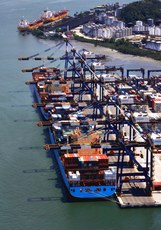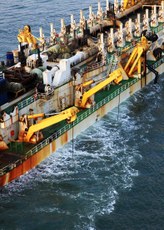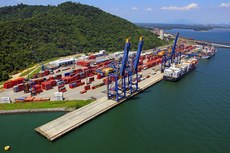Expected Investments
The Brazilian government initiated an extensive process of modernization and opening of investments for the port sector. Private investments are expected to reach R$ 36 billion over the next three years, considering the leases of public areas in ports, terminals permits for Private Use (TUP) and requests for authorization of long-term investments in terminals that are already leased within public ports.
The Brazilian Investment and Leases Program (Ports-PIL) considering the port sector should inject more than R$ 17 billion in investments, which adds up to approximately R$ 9 billion forecast in the 22 authorized private use terminals until May of this year. Companies that operates in public ports and has contracts maturing after 2017 may submit a plan for long-term investments and request an extension of their contracts. The expectation is that more R$10 billion will be invested in this modality.
The new regulatory framework for the Brazilian port sector was consolidated into Law 12,815 on June 2013. The goal of the federal government is to modernize the country's port infrastructure, eliminate barriers to the flow of commerce fostering cost reduction and increase efficiency in cargo handling. Law 12,815 establishes the criteria for private participation in the port sector, which is essential to achieve the volume of necessary investments.
The indirect operation of public ports and port facilities will be made through concessions (assignment of the entire port) and leasing (granting of areas within the port) to the private sector, both effected through public auctions conducted by Brazil's National Waterway Transportation Agency (Antaq). In areas located outside public ports, private exploration occurs through authorizations granted to companies via adhesion contracts.
Lessees and operators authorized to operate port terminals must follow these guidelines:
• Ensure the expansion, modernization and optimization of the infrastructure and superstructure that integrate organized (public) ports and port facilities;
• Practice best prices and rates in the industry;
• Ensure the modernization and better management of ports and port facilities, including the development and qualification of port workforces;
• Ensure navigation safety at the entrance and exit of vessels from ports; and
• Provide incentives for private sector participation, ensuring broad access to organized ports, port facilities and activities.
Port Lease Program
In 2013, the Logistics Investment Program (PIL), a private initiative concessions program that provides the integration between roads, railways, ports and airports in articulation with supply chains, established investments of R$ 54.2 billion in the modernization of Brazil's port sector to be made by 2017. Of this amount, R$ 17.2 billion have been allocated for the Port Lease Program.
The auctions for port concessions have not yet had their dates established. Before each auction, the bidding process involves the following steps:
• drafting of the technical, economic and environmental feasibility studies;
• analysis of the studies by the Secretariat of Ports/ANTAQ Joint Committee;
• organization of public consultations and hearings,
• submission of studies and documents to Brazil's Superior Court of Audit (TCU);
• publication of bid notice;
After studies and dialogue with the port community, 159 areas subject to the private sector leasing were defined.
Concessions and leases will be conducted through contracts, always preceded by a bidding process. These proposals should take into account the nature of each port. Evaluation criteria to be considered for awarding the bids, either combined or in isolation, include largest capacity for cargo handling, lowest rates or shortest cargo handling times.
Future tenants of port terminals inserted in public port areas must ensure the reasonableness of rates and the reduction in port costs (lowest rate) as well as the expansion, modernization and optimization of the infrastructure and superstructure that integrate the organized ports and port facilities.
The winners of the port lease biddings will be subjected to contractual requirements that take into account: minimum investment, minimum yield and minimum capacity. In the case of port terminal bids with handling capacity as the awarding criteria, the government may establish mandatory rates if there is a risk of abusive pricing practices or the need to ensure equality in the provision of services. For terminals procured by the lowest rate, minimal cargo movement rates will be established to prevent idleness in the terminal and ensure access for all users.
Authorizations for the installation of port facilities outside public ports will be awarded through public calls or announcements and a subsequent selection process organized by the National Waterway Transportation Agency (ANTAQ). The term of the exploration contract is of 25 years, renewable for successive periods.
Private terminals Private terminals accounted for 65% of Brazil's cargo handling in 2012. The port system (public ports and TUPs) as a whole allowed the movement of 904 million tons (solid bulk, liquid bulk and general cargo) in 2012, up from 886 million tons in 2011 - an increase of 2.07%.
Private terminals accounted for 65% of Brazil's cargo handling in 2012. The port system (public ports and TUPs) as a whole allowed the movement of 904 million tons (solid bulk, liquid bulk and general cargo) in 2012, up from 886 million tons in 2011 - an increase of 2.07%.
Nowadays, there are 128 Private Use Terminals (TUPs) and 6 Cargo Transshipment Stations (ETCs) authorized to operate in Brazil. Until June 2014, the existing permits for operation will be adapted by ANTAQ and a new contract will be signed between the interested party and the SEP. The new private terminals must operate outside the area defined for the organized (public) port.
The entry into operation of the terminals currently seeking SEP authorization will promote an estimated increase of approximately 18% in private terminal handling volumes.
According to the new regulatory framework of the sector, those interested in obtaining authorization to build a port facility outside a public port's area can submit a request to the National Waterway Transportation Agency (ANTAQ) at any time.
After receiving the request, ANTAQ will then publish the full contents of the request and its annexes and open the Public Announcement, which establishes a 30-day period to identify the existence of other companies interested in building a port facility in the same region and with similar features.
To learn more about the process, the required documents and the public announcements, see: http://www.antaq.gov.br/Portal/AnunciosPublicos.asp (in Portuguese)
According to the Port’s Law, exploration (with authorization from the Secretariat of Ports) is allowed for port facilities located outside public ports and operated in the following modalities: Private Use Terminal (TUP); Cargo Transshipment Station (ETC); Small Sized Public Port Facility (IP4) and Tourism Port Facility (IPT). The entry in operation of the port facility must occur within three years from the date of the celebration of the adhesion contract, which is renewable only once for the same period.
The authorization for port operations lasts for 25 years, renewable for successive periods, as long as port activity is maintained and the authorization-holders makes the necessary investments for expansion and modernization of the port facilities.
The National Dredging Program – PND The National Dredging Program II is expected to attract about R$ 4,7 billion in investments in 2014 and 2015 for dredging in 20 Brazilian ports. The first contract will be signed at the Port of Santos, after the Ports Secretariat finalize the public bidding process that began in May,2014.
The National Dredging Program II is expected to attract about R$ 4,7 billion in investments in 2014 and 2015 for dredging in 20 Brazilian ports. The first contract will be signed at the Port of Santos, after the Ports Secretariat finalize the public bidding process that began in May,2014.
The dredging works demanded will be contracted on result-based method by Secretariat for Ports (SEP/PR), whose main characteristics are:
• aim to ensure the effectively of the investments;
• sign contracts that may contemplate more than one port or harbor and other services like Aids to Navigation and Buoyage and Environmental monitoring in order to keep depth and navigation security conditions;
• consolidate Brazil as an attractive dredging market and also increase competition among companies.
Click here to understand about the National Dredging Program II program.
Click here to know the bidding forecast.
Port operating companies will invest around R$ 10 bi in Public Ports The federal government will start issuing authorizations for the anticipated renewal of leasing contracts of public port areas that were signed based on Law 8.630/1993 (old Ports Law). These are terminals that were leased to the private sector after 1993 and which will have their contracts terminated by 2020 and on.
The federal government will start issuing authorizations for the anticipated renewal of leasing contracts of public port areas that were signed based on Law 8.630/1993 (old Ports Law). These are terminals that were leased to the private sector after 1993 and which will have their contracts terminated by 2020 and on.
In accordance with the new port sector regulatory framework (Law 12.815/2013 and Decree 8.033/2013), port terminals must present to the National Agency of Waterway Transportation (ANTAQ) projects regarding the expansion and modernization of their facilities in order to have the right of a new 25 year term extension.
In exchange for the anticipated renewal of their contracts, the companies must present a long term investment plan which must be sent to ANTAQ. The Agency will then carry out the analysis of the request and after its green light submit it for SEP´s approval of the renewal. More than 20 companies have already requested this anticipation.

